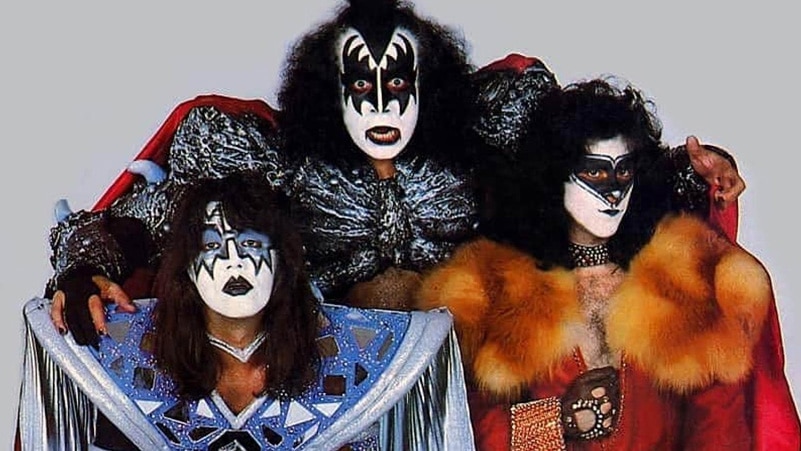On 13. December 1982, Kiss were awarded $520,000 in U.S. District Court as a result of a breach of contract suit against Phonogram International B.V. Kiss claimed failure to pay $1,772,655 in royalties on the part of Phonogram on album product released between June, 1977 and March, 1979.
Billboard:
NEW YORK – After a five-day jury trial, members of Kiss were awarded $520,000 in U.S. District Court here Dec. 13 as a result of a breach of contract suit against Phonogram International B.V.
In their action of February, 1982 (Billboard, March 6), the four members of Kiss claimed failure to pay $1,772,655 in royalties on the part of Phonogram on album product released between June, 1977 and March, 1979. Their complaint charged the defendant and defendant’s “predecessor in interest,” Casablanca Record & Filmworks, with harming the group’s career by “engaging in massive and unwarranted over-shipments” of their product “at distress or ‘schlock’ prices.” Kiss further demanded compensatory damages of $5 million and an award of punitive and exemplary damages of at least $10 million.
During the trial, the jury heard testimony from one Kiss member, Gene Simmons, on the understanding that testimony from Paul Stanley, Peter Criss and Paul “Ace” Frehley would be similar in nature. The jury’s verdict divided the award as follows: $290,000 for injury to the group’s career and reputation and $230,000 for royalty payments on sale of recordings at “schlock” prices.
Phonogram was a defendant in the case as a result of a contract between Kiss and the PolyGram company dated April, 1980, from which time through December, 1980 claims were made on failure to account for royalties on sales of 1,330,000.
According to some reports, Phonogram had offered about $1 million for an out-of-court settlement of the matter. Attorneys for Phonogram would not comment on this.
– Billboard, 25. December 1982
Axeology:
The band’s 1980 contract with PolyGram, which was almost ridiculously lopsided in the band’s favour, had specified that KISS consisted of Gene, Paul and Ace. (The contract with PolyGram actually specified that the band had to consist of three fourths of the original band but for all intents and purposes that meant Gene, Paul, and Ace; the odds of Peter coming back weren’t even playing in Vegas.) Having been informed about some dubious practices on the part of their record company, in early 1982 the collective members of KISS had filed a lawsuit against PolyGram’s parent company Phonogram. Although Chris Lendt reported in KISS & Sell that the lawsuit was for $6 million contemporary reports had the band demanding compensatory damages of $5 million and punitive and exemplary damages of at least $10 million. Rumour has it that Phonogram offered a settlement, preferring that the case not go to trial, but that KISS through their lawyers declined the offer. If it had been made official in mid-1982 that Ace was no longer in the band it would have prompted a counter-suit from Phonogram or an effort to have the case thrown out because the band were in breach of their contract.
The verdict was handed down on December 13 and although it was in KISS’s favour it was truly a pyrrhic victory. When they were awarded a paltry $520,000 ($290,000 for injury to their career and reputation and $230,000 for unpaid royalty payments) more than half of those monies went to legal fees and trial costs. This created an even worse situation for the band. If they had been awarded the sums they asked for they could easily have allowed their contract to void and look for another record contract elsewhere. They were, after all, still KISS. But, with the verdict in and no money forthcoming, if Ace was no longer a member of KISS then their contract was void and it would have been open season on KISS for PolyGram. That’s why there were serious efforts to make it appear that Ace was still in the band even if he was not a touring member at the moment. The entire promotion of the early part of the tour chose to handle his absence in a ”roundabout” way to avoid a retaliation from the record company.
– Axeology
Dale Sherman:
The only ones who felt taken by the whole practice were the bands and performers since they saw little or nothing from these types of deals. Which was exactly why KISS decided to sue over the practice when it was discovered that Phonogram (and, to an extent, Casablanca) had overproduced so many copies of such albums as Unmasked, Double Platinum and the solo albums that they were being dumped on the cut-out market at, according to the suit, “Distress or ‘schlock’ prices.” In doing so, it made the band appear as if these albums did not sell well at all and contributed to the-growing feeling among fans that the band were has-beens, unable to sell enough albums to stay off such a market.
Thus, the members of KISS requested that the Manhattan Federal Court award them the royalties they felt they deserved for the albums distributed, along with $5 million in compensatory damages and at least $10 million in exemplary damages due to the dumping of the albums, plus lawyers’ fees and court costs. For their part Phonogram fought the suit, denying that they consciously attempted to “dump” the albums on the “schlock” marketplace. Yet, as reported in BILLBOARD (“Major Acts are Among Schlock on Cutout Lists” by Paul Green, April 17, 1982, page 16), when it was clearly shown that copies of Paul’s and Peter’s solo albums were selling at Great Atlantic stores for 50 cents apiece, it was obvious that something was not quite right with the system. On December 13, 1982, the U.S. District Court awarded the group $520,000. It was at least a financial victory for the band, although it left a sour taste in Phonogram’s mouth, which would be reflective in the growing distance between the label and the band as the 1980s continued.
– “Black Diamond: The unauthorized biography of Kiss” by Dale Sherman.







